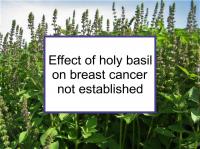Holy basil (Ocimum tenuiflorum) incorporates apigenin, eugenol, luteolin, ursolic acid and other compounds with antioxidant, anti-inflammatory, antimicrobial, and antifungal properties. While they are closely related, basil (Ocimum basilicum), otherwise known as sweet basil, is not exactly the same plant as holy basil (Ocimum sanctum).
Breast cancer-related effects of holy basil
Holy basil has been shown to inhibit breast cancer (including DCIS) growth and progression by affecting cell proliferation and angiogenesis in a mouse experimental model. A 2023 study reported that holy basil extract inhibited the proliferation of ER+/PR+ breast cancer cells.
Ursolic acid has been shown to reverse multidrug resistance in breast cancer cells. One study found that ursolic acid reversed resistance to paclitaxel in paclitaxel-resistant triple negative breast cancer. Another study reported that ursolic acid resensitized multidrug resistant ER+/PR+ breast cancer cells to doxorubicin chemotherapy. Still another 2021 study demonstrated that ursolic acid also increased the sensitivity of triple negative breast cancer cells to doxorubicin.
Additional comments
Holy basil, which is not typically consumed as food in the U.S., is available as a herb or as tea (Tulsi tea). Holy basil should be purchased organic.
Sources of information provided in this webpage
The information above, which is updated continually as new research becomes available, has been developed based solely on the results of academic studies. Clicking on any of the underlined terms will take you to its tag or webpage, which contain more extensive information.
Below are links to 20 relevant studies concerning this food and its components. For a more complete list of studies, please click on holy basil.
